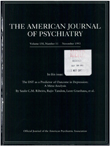Controlled discontinuation of benzodiazepine treatment for patients with panic disorder
Abstract
OBJECTIVE: The purpose of this study was to compare the effects of discontinuing treatment with intermediate- and long-acting benzodiazepines. METHOD: Fifty patients with panic disorder who had taken part in a double-blind treatment study and had responded to alprazolam, diazepam, or placebo for 8 months were asked to stop taking these medications gradually. RESULTS: After a relatively rapid dose reduction, the majority of patients relapsed. Rebound anxiety and withdrawal symptoms were identified in a substantial minority of patients. Those who were taking alprazolam showed earlier and more intense rebound anxiety and withdrawal symptoms than did the patients who received diazepam. Both the level of pretreatment anxiety and the drug the patient was taking predicted the level of anxiety when drug treatment was discontinued. CONCLUSIONS: The findings indicate that withdrawal phenomena commonly occur after patients stop taking benzodiazepines and that they are more frequent after discontinuation of treatment with shorter-acting drugs.
Access content
To read the fulltext, please use one of the options below to sign in or purchase access.- Personal login
- Institutional Login
- Sign in via OpenAthens
- Register for access
-
Please login/register if you wish to pair your device and check access availability.
Not a subscriber?
PsychiatryOnline subscription options offer access to the DSM-5 library, books, journals, CME, and patient resources. This all-in-one virtual library provides psychiatrists and mental health professionals with key resources for diagnosis, treatment, research, and professional development.
Need more help? PsychiatryOnline Customer Service may be reached by emailing [email protected] or by calling 800-368-5777 (in the U.S.) or 703-907-7322 (outside the U.S.).



